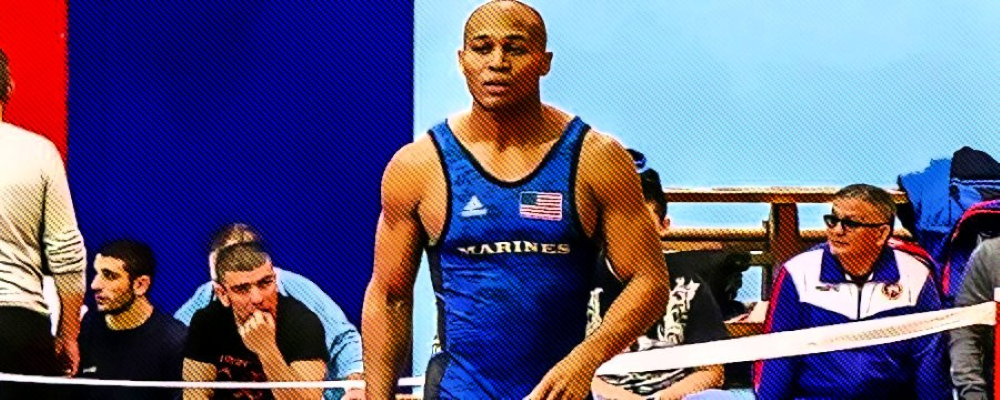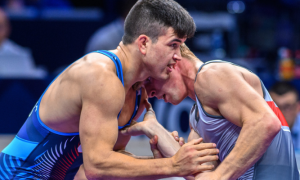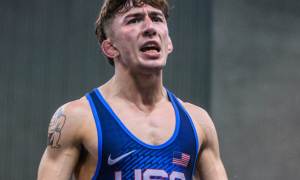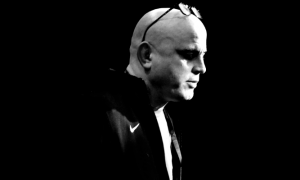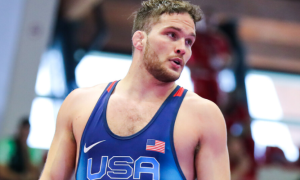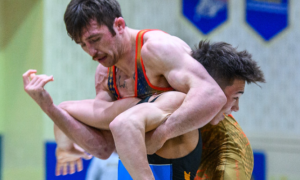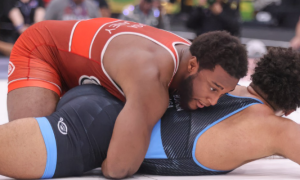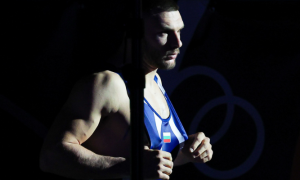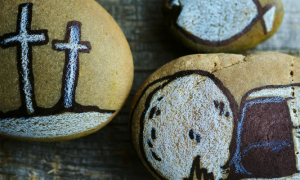It almost feels as though Terrence Zaleski (Marines) is lying in wait. Or to borrow a military metaphor, preparing an ambush. Even when Zaleski isn’t the focal point or goes unseen, people still know he’s out there. And that knowledge alone increases awareness.
Zaleski’s career as a Greco-Roman athlete began a while ago, but it has only been within the past two seasons when the populous has really taken notice. Odd, if only because we are talking about a wrestler who placed third in the nation back in 2014, but such is the way things run in this corner of the sporting world.
But to be fair, back then Zaleski was in, but he was not utterly and completely all-in just yet. A talented high school competitor a decade prior who eventually captured a North Carolina state title, he was all set to make an impact on the Division I level until his school, University of North Carolina-Greensboro, cut the program. For as unfortunate as that was — and it was — the silver lining involved couldn’t have been shinier. That’s because UNC-G’s head coach, Jason Loukides — a man who enjoys run-through-fire loyalty from virtually all of his athletic charges past and present — refused to let that be the end.
As he did with Jamel Johnson (67 kg, Marines) and every other potentially displaced UNC-G wrestler at the time, Loukides offered another path to competition: Greco. Zaleski got a look at the domestic scene, laced ’em up to varying degrees of success, and resumed his collegiate career at the University of Pembroke. But he saw something. He got it. And when he was finally ready to take on the world, literally and figuratively, Loukides was there once again offering another chance to keep it going.
After finishing up Officer Candidate School, Zaleski joined Loukides (and by then, Johnson, who had come over from Army/WCAP) on the All-Marine Team. It was a reintroduction to the sport. A lot had changed entering the new quadrennial. There was turnover, there were new rules, there was a different vibe settling in. Zaleski, forced to adjust to everything all at once, was undaunted. He worked himself into the argument at 82 kilograms last year, first finishing seventh at the US Open, and then fourth at the World Team Trials.
This past season, Zaleski started off strong with a bronze medal in Russia and rode that wave to several strong domestic performances, including a fourth at the US Open. In August, Zaleski flashed some more of his skills at the Tbilisi Grand Prix, which will go down as his last tournament at 82 kilograms for the time being. He is just always on the move, always working to connect the dots, and the picture he hopes to display at the end is a spot on the 2020 US Olympic Team — but at 87 kilos, since 82 isn’t part of the curriculum.
Appropriate preparations are underway for Zaleski as he attempts to engineer a run in one of the country’s two (or three) most competitive weight categories. He’s up for the task. Talk to anyone who has watched him do battle, new guys and savvy vets alike. Most understand Zaleski’s stops and starts were always going to be temporary, and that there might come a day when the ability matches up with the consistency. We’re coming closer to that day’s arrival, so it isn’t a bad idea for those interested to be on high alert.
You just never know when trouble lurks around the corner.
Terrence Zaleski — 87 kg, Marines
5PM: Either when or even before full-time Greco became a part of your life, what did you see as the type of adjustments you were going to have to make?
Terrence Zaleski: To tell you the truth, I was first introduced to Greco in high school. Ray Bruno, who just retired from refereeing, was my high school coach here in Jacksonville, North Carolina when I wrestled at White Oak. He used to always talk about Greco-Roman wrestling, and I used to always love wrestling upper-body. This was in high school, so 2007, 2008. But I never really took it anywhere. He just showed me underhooks and things like that. I actually didn’t take a shot until my junior year because I didn’t like going down to a knee.
Once I got to college, I thought I was going to be this All-American, a National champion, just like any other kid who goes to college to wrestle for a Division I program does. Then they cut the program at UNC-G. Coach Loukides gave us an opportunity. He said, “Do you want to keep wrestling? Do you want to transfer? Or do you just want to school?” Some chose to keep wrestling with Loukides, some chose to transfer out, and some chose to stay in school. But the catch was if you were going to wrestle for Loukides, you were only going to wrestle Greco-Roman.
I loved it because I love the high reward Greco has. Because, it’s a tough sport at the end of the day. It’s a really tough sport. But you get so much satisfaction when you succeed. Whether it’s a two-point takedown or a five-point throw, it is the same satisfaction to me because it shows I’m improving in some parts, or I’m dominating this match, or imposing my will in this type of way.
As far as adjusting to full-time, it didn’t really hit me until I got to the Marine Corps and began training two times a day. Before, it was just maybe once a day for two hours, and this was from 2010 to 2014, ’15. I was wrestling for Pembroke then collegiately. I think I took fifth at the US Open. The year before that I took third in Greco and I was pretty much half-training. Going to the wrestling room, doing a couple of drills, and then leave. 2016 is when I decided to join the Marine Corps, so I went through that whole process. 2017 is when I finally got onto the All-Marine Team after doing all of the training required.
I’ve just been working on developing because I know what kind of beast this sport is. I’m just slowly chipping away. It’s frustrating, too, because you see your teammates taking off at all of these different speeds. But I have to understand that I’m going at my own pace — and improving at my own pace. Like Sergeant (Xavier) Johnson, he is taking off really well. Jamel (Johnson), we go way back. He was on the University World Team back in the day, wrestled for (Army) WCAP. He’s doing really well. All of our guys who are the National Team I am really close with. You’ve got your onesies and twosies like me and Vaughn (Monreal-Berner), (Colton) Rasche… We are all solid, decent wrestlers, we’re just not on the National Team. But our time is coming. We are slowly chipping away. Not just us, but the rest of the team. People don’t see that. They only see results, but results only get you so far when you’re working really hard in the background.
5PM: When you were at UNC-G with Loukides, did he espouse Greco virtues upon you?
TZ: When he first got a hold of us, he just wanted to see what kind of fight we had. Maybe he would show us an arm drag, an arm throw, or bodylocks — big moves, and then he would go from there. He never taught us how to gutwrench; he wanted us to bodylock and lift just to show that we’re threats. That was our foundation at UNC-G.
From there, he built us up. He taught us how to pummel and some more technical things. There were so many times when it was just a group of us — like five or six of us with YES Wrestling — when we just wanted to quit because weren’t getting any results. He would pay all this money for us; he would drive us to (Colorado Springs), the World Team Trials, US Open; fly us everywhere on his budget, however he got the money; and we would go 0-2. Back then, Caylor Williams was the face of the YES Wrestling program and earning all of the trophies and medals, and you had the rest of us just trying to figure it out.
But he (Loukides) would never let us quit. He made sure that we stuck with it, and it slowly paid off. Anytime he gives me advice or has suggestions, I am always open-ears to that man because I owe a lot to him. I would not be as successful in my personal life right now without Coach Loukides. I say that with an open heart because that man has looked out for everyone who he has been around. That includes me, Jamel, and my friend Santonio (Thompson) who competed at the US Open a couple of times, as well. He definitely cares about our wrestling careers and our personal lives. You can’t ask for a better coach than that. To me, that’s what coaching is about. I coached at Fargo this year and have helped out at high schools here and there. I always try to emulate what Loukides does for me with those kids, because that’s how you truly impact the sport and their lives.
5PM: Since you go back with Jamel, I figured I’d ask you, what do you like or have noticed about his game? You kind of come from the same baseline.
TZ: At the end of the day, Jamel is tough. He is tough and he is strong, especially for his weight. We call him “Juice”, that has been his nickname since we were in college, mainly because everyone thought he was on steroids because he was so strong. Weighing 135 (lbs) benching over 300 back then, and he is still benching over 300 now.
Jamel is tough mentally, man. When he sets mind on something, he is going to do it. That’s what I notice about him. Us going way back, I try to reel him in so he doesn’t zone out too much, or zone in too much, so he could see the brighter picture of things. He kind of balances me out so that I am zoning in on myself, because I am so focused on the other things around me or the other people around me. That’s what I’ve really noticed about Jamel. He is really good at focusing on something. Saying he wants something and going to get it.
5PM: The Marines have a great situation, your team travels around quite a bit. There are differences between foreigners and domestic opponents. Do you compartmentalize these differences and does that change your approach? Or do you wrestle both types of opponents the same?
TZ: I usually try to maintain my same approach. The differences between competing in the US versus overseas… In the US, people usually know you. They might be biased, whatever it is, some people may like someone else, and you have to wrestle through that adversity. Whether it’s a bad call, bad seeding — it doesn’t matter, you have to wrestle through that. What Coach does is throw us in those situations all the time.
When we went to Tbilisi, we were notified like, a week before. Our weights were nowhere near where they should have been, everyone was kind of in a laid-back mindset just training and not really preparing for competition. Then one week out, Coach was like, Hey, we’re going to Tbilisi. So we’re like, Oh crap, here we go.
We get out there and the focus was on making weight and competing. It didn’t matter who we were competing against, we didn’t know anything about the tournament, or anything about who was in the tournament. I just knew what I had to focus on. Whether it is domestically or internationally, I go into my matches with a focus because I am constantly trying to improve on things. For example, I know I have a lift — Okay, let’s work more on my pummeling, work more on my takedowns, let me work on my off-balances and see what is successful. Because, at the end of the day, I have nothing to lose. As long as I qualify for the Trials, I’m in good standing. I have to be able to beat whoever stands on the mat with me. Whatever situation I’m faced with — like if I’m up 3-0 going into the second period. Yes, I got put down and lifted for four, but ultimately I have to be able to defend a lift.
So I don’t compare internationally versus domestically. I have to win those matches. At the World Team Trials, I lost to Cheney (Haight) and (Geordan) Speiller. I have to be able to beat those guys. My teammate John Stefanowicz proved he can do it. And if you look in the wrestling room, Johnny and I got back and forth. The only difference is he’s out there making it happen in competition. So it’s just the small adjustments I need to make that Olympic Team.
5PM: In Tbilisi, you had a very good match against a very tough opponent. In the first period, you looked like you were going to step up for a side lift, but instead, you came back down with your lock. He fought and fought and fought, but you willed him over, and that was a big gut. Scores like that, when you watch a match like that afterwards, do you notice things that worked out well?
Terrence Zaleski: Yeah, I do. That specific gut, I had been practicing it, but leading up to it my mindset was, He is going to get turned or lifted. I am going to score on him from top. That is my mindset, that is my goal. I worked on side lifts, straight lifts, straddle lifts, and guts leading up to that tournament. That’s what I do. When my teammates need help defending lifts, I will throw a flurry of different lifts at them. That’s how you get better — and when they defend, that’s how I get better. That is how I am able to throw these crazy combinations, which enabled my gutwrench to be successful in that match.
If you go back to the US Open, I was hitting moves that kind of related to that similar gut, but I would just lift the guy instead. It was just a combination of things. However, my mindset was just, He is going to get turned from top; this is my chance. I got the passivity, so I did my job on the feet. Then it was time to finish the job on top. So that’s what it was, my mindset.
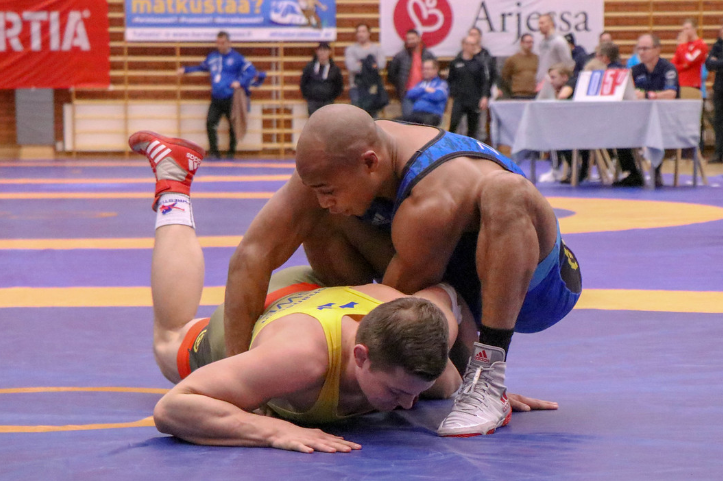
Zaleski (blue) opened up the 2018-19 season with a European tour that included stops in Russia, Sweden, and Finland. (Photo: All-Marine Wrestling)
5PM: Are you, competitively speaking, a hard marker when it comes to your performances in terms of examining performances? Or are you more just like, ‘Okay, this is what happened, and this is how to improve it‘?
TZ: I used to be really hard on myself because I wanted to be so good, so quick. But the more I have wrestled Greco-Roman, the more I have become laid-back, This is how it was, this is how it goes, this is what I need to do to make improvements. That approach has helped me a lot, especially within these past two years of developing my own style of wrestling.
5PM: When you had that interim between college, joining the Marine Corps and then joining the All-Marine Team, did that hiatus or break from the sport result in a sort of freshness for you with wrestling? Like a new beginning?
TZ: Yeah, it really did, especially finishing up my college career. It was like a deep breath. It made me hungry again, because it made me appreciate the sport for what it was and how much I really do love it. Because, that one-and-a-half or two years away from the sport, in general, just made me want to be on the mat again. I remember Coach pulled me from my school house for Armed Forces and I hadn’t trained in over a year. I took second in freestyle at Armed Forces that year, and I was dead tired. And Coach said, “See? You wrestle better when you’re tired.” He knows that when I’m tired, I am just throwing everything out there at them and trying my hardest. That was pretty much my foundation when I came back. I know if I go all out how tired I can possibly get– but if I know what I’m doing, I can do a lot more with a lot less energy.
5PM: As a wrestler, how was your basic training for the Marine Corps? Can you compare the two?
TZ: I went to Officer Candidate School, which is a little bit different than regular basic training. I think theirs (the Army’s) is 13 weeks, ours is ten weeks but then we have six months of the basic school, which essentially teaches you basic infantry leadership tactics. OCS is our equivalent to their basic training. To tell you the truth, I loved it. Especially being a wrestler, it was like wrestling workouts everyday. To me. The sprinting, the buddy carries, the pull-ups — I excelled very well in that. In fact, there were a lot of other wrestlers in my OCS class, which I was shocked about, and they excelled, as well.
The wrestler mindset going into that type of training sticks with you because you know what hard work feels like. You have guys from all over who probably never pushed their bodies to limits where they think they can’t go anymore, but then they somehow find the will. But as a wrestler, you already know what that feels like. That wrestling mindset going into that training sticks with you.
Honestly, I think that is a key part of being a good Marine, those qualities that wrestlers have. They teach those qualities in the Marine Corps, but being a wrestler and already having those qualities developed helps that much more. The discipline. As wrestlers, we are always on strict diets, particularly in college and high school when you can only eat so much at different times of the day. Training for the Marine Corps, you’re only eating, what? Three core meals a day? And maybe a protein snack in between? Maybe? And you had guys complaining, but the wrestlers were like, This could be a lot worse (laughs). Different stuff. Training while malnourished, yeah, we know all about that.
5PM: It would seem it is a natural fit, the Marines and wrestling.
Terrence Zaleski: One of the things I love that we do on the All-Marine Team, is that recruiting commands reach out to us and we host clinics all over the US. I used to be in charge of those operations, but now Captain (Peyton) Walsh is. I think within five or six months we hit over 40 high schools and colleges. We taught fundamental folkstyle stuff, but we also touched up on Greco-Roman wrestling. That is one way we try to grow the sport. Doing that, because kids, psychologically speaking, will be like, I don’t want to do Greco-Roman. I don’t want to be thrown on my neck. But once you teach them the fundamentals, they realize it’s not that bad. Hopefully as time goes on, that opens up new doors for them in the future.
We actually have kids who are on the team or have come through the team tell us, You actually came to our high school in Oregon last year, or wherever. And then we are like, Wow, really? And now you’re on the Marine Corps Greco-Roman wrestling team. That is the type of impact we love making.
5PM: You have decided to go 87 kilograms this season. You know what this weight class looks like, you work out with 87’s. Is this the type of situation where you have to gain a little weight? Do you want to be a little bit bigger and are there special in plans for this year to compete at this weight class?
TZ: 82 (kilos) were perfect for me. It was ideal. I felt strong, I felt quick enough, but the decision to go up to 87 was a couple of things. One, if I did decide to drop down to 77, I would be more focused on weight-cutting as opposed to developing my wrestling. And as we’ve discussed, development is really big for me right now. Going up to 87, I will be more focused on developing instead of my weight because I naturally walk around at 86 kilos. So I have to do a little bit of weight gaining and spend a little more time in the weight room.
Stylistically, the 77-kilo dudes are definitely lighter and definitely easier to lift, and definitely easier to pummel with. But they are also a lot quicker. At 87, more so for me, they are still powerful dudes but I feel that I am just as powerful, especially once I start hitting the weight room again. I just feel like 87 is the best weight to go, and it wouldn’t hurt to put on a little more muscle mass, as well.
5PM: Like you said, 87 kilos does slow down a little bit, more plodding. When you look at 87, do you envision ways to create more scoring opportunities in a weight class where, honestly, not everyone does?
TZ: Yeah, definitely. I hope to, at least. That’s my goal. The guys at 87, I have wrestled a lot of them in the past. Granted, back then I wasn’t as developed as I am now. But I feel like I will still be able to score. I am still quick, I am still strong. I am still Terrence Zaleski. Nothing is going to change going up there for me as far as my style is concerned. Like I said, it is just the small improvements I make, and no matter who steps on the mat, they are going to get mashed when they wrestle me. At the end of the day, I look at myself as a threat. I know I’m a threat. If you slip up, I’m going to expose you. That’s a big thing with Greco. It’s a game of inches.
5PM: This is going to be a compressed schedule. I don’t know what you’re obligated to, but do you want to maintain as active of a profile as possible leading up to the Trials so you can get in a lot of reps at 87?
TZ: No, not really. My goal right now is developing my wrestling, gaining the weight, and becoming a little stronger. I am still not even sure if I will go to the Bill Farrell (November 15 in New York) as of right now, just because I want to stay back and focus a little more on weightlifting and not cutting weight or anything like that. The goal right now is to qualify for the Trials. Go to the Nationals, place in the top-five. If I don’t place in the top-five, then win Armed Forces. And if that doesn’t work out, go to the Last Chance Qualifier. I feel like I have plenty of opportunities to qualify for the Trials, and that’s the main goal right now, to get there while constantly making small improvements and peak at the right time.
5PM: When you trace back your introduction to Greco, your time in college and now with the Marine Corps and becoming an established competitor, are you satisfied with the track you’re on?
Terrence Zaleski: Am I satisfied with the track I’m on? I can say that I’m satisfied with the track I’m on. Am I satisfied with where I am on that track? No. But I am on the right track, which is good. I’m starting to see the light. When I first started out on the All-Marine Team and not making National Teams and whatever, it was very frustrating. But like I said before, the more I train and the more I wrestle, the more I can see the small pieces coming together. I feel like when it’s my time, it is going to be my time, and I am going to prove that point. I’m not worried about being the top dog at the moment. I am just worried about getting the opportunity to take that spot away from whoever is the top dog.
Listen to “5PM28: G’Angelo Hancock, Joe Rau and Max Nowry” on Spreaker.
SUBSCRIBE TO THE FIVE POINT MOVE PODCAST
iTunes | Stitcher | Spreaker | Google Play Music | RSS

Notice: Trying to get property 'term_id' of non-object in /home/fivepointwp/webapps/fivepointwp/wp-content/themes/flex-mag/functions.php on line 999

